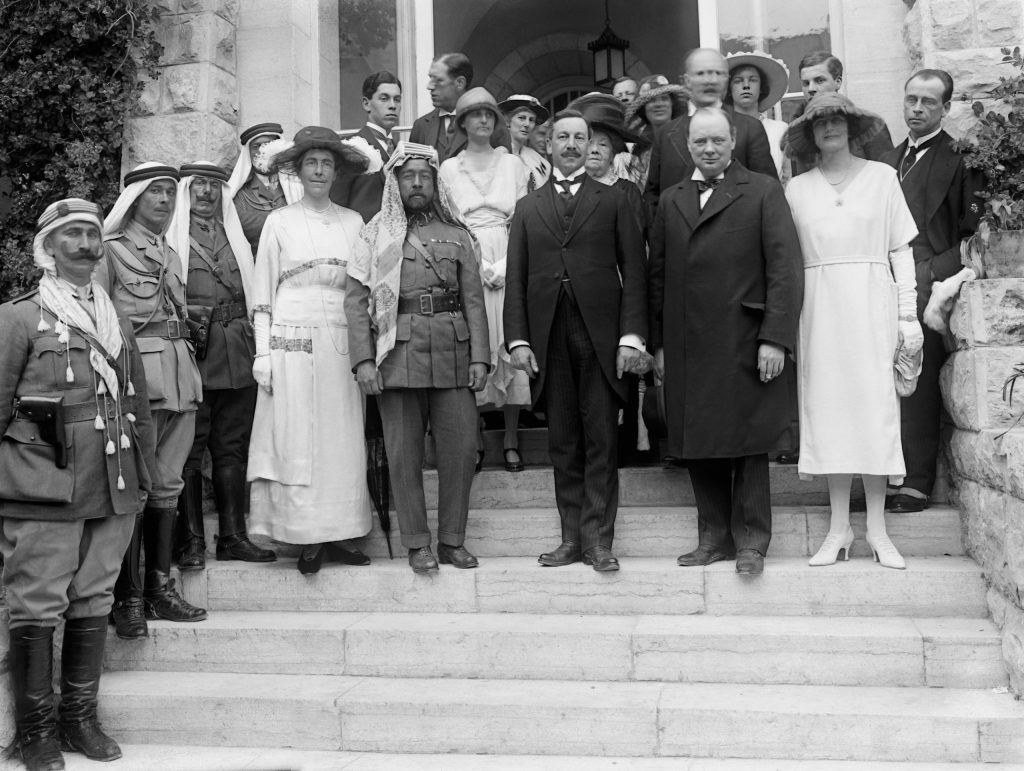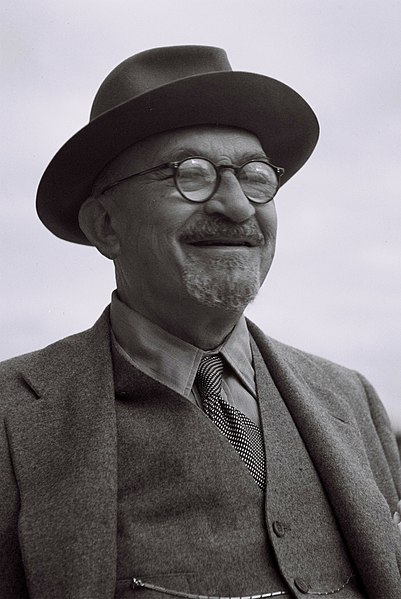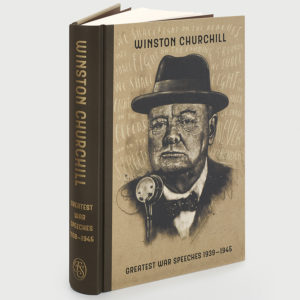
Finest Hour 191
The Road to Zion

Winston and Clementine Churchill
January 1, 1970
Finest Hour 191, First Quarter 2021
Page 22
By Michael Makovsky
Michael Makovsky is President and CEO of the Jewish Institute for National Security of America (JINSA) and author of Churchill’s Promised Land (2007).
One essential element of Winston Churchill’s character and greatness, and a source for frequent opposition, was that he did not fit in neatly with his times. He had a complex world outlook that blended different credos. No issue better illustrates Churchill’s distinct identity, and explains his worldview, than his highly favorable attitude toward the Jews and their causes. It was not a fully pristine record, particularly early in his political career, but fundamentally he was very philo-Semitic and pro-Zionist, which were central to the core of his being.
Antecedents
Churchill was born into a family, class, and country that at best had a complex relationship with Jews. England was the first European country to charge Jews with ritual murder (in 1144) and the first to expel the Jews en masse (1290). There was a common view in Victorian England that the Jews were a rootless quasi-nation spread across the globe, racially inferior, devoted to a noxious religion, socially estranged, and a source of social and political turmoil. Yet, Victorian England also granted Jews political emancipation (1858) and absorbed tens of thousands of Jews fleeing Russian pogroms in the early 1880s. That period also saw the growth of a Christian evangelical movement that sought Jewish restoration to the Holy Land, albeit to trigger the Second Coming.

2025 International Churchill Conference
Benjamin Disraeli and his career embodied these contradictions. Born Jewish, his family converted to Christianity right before his bar mitzvah, and he became a towering political figure and prime minister, who headed a Conservative party filled with landed aristocrats who generally disliked Jews. In a period of great focus on race, Disraeli embraced his Jewish racial heritage and argued that Jews were one of the world’s great races, which along with Providence had enabled them to survive centuries of persecution. He contended, apparently based on Genesis 12:3, that God blessed those countries that treated Jews well and cursed those that mistreated them.
Lord Randolph Churchill, Winston’s father, considered himself a protégé of Disraeli and reiterated in his speeches many of these themes. While he sometimes manipulated Jewish stereotypes for political gain, Lord Randolph was fundamentally philo-Semitic, championing Jewish causes such as political emancipation and criticizing Russian pogroms.
Young Winston
Winston Churchill admired his dismissive father and read all his speeches. Young Winston imbibed Lord Randolph’s devotion to Disraeli and philo-Semitism. He even once rebuked his mother, whom he adored, for referring to someone as a “bastard Jew” and was thrilled when Alfred Dreyfus, the Jewish French military officer who had been framed for treason, was cleared of what Churchill called a “monstrous conspiracy.” Churchill’s natural philo-Semitism was mostly enhanced by his many personal encounters with Jews, whether the mega-wealthy Jewish friends of his father, such as the Rothschilds, or the many poor Russian Jewish immigrant constituents in North-West Manchester. And Jews remained his most loyal supporters.1
Like his father and Disraeli, and unlike many late Victorians, Churchill did not consider the Jews inferior Christ-killers, but a great ancient race whose heritage he respected and to which Christians were indebted. At a 1905 Manchester meeting protesting Russian anti-Semitic pogroms, Churchill strongly condemned this persecution (just as his father had in 1881) and pointedly warned Russia by citing an adage that he attributed to Disraeli: “The Lord deals with the nations as the nations dealt with the Jews.”2 He quoted it a number of other times throughout his life, reflecting a sincere belief in it.
Yet, early in his career, Churchill sometimes deployed antiSemitism as a political tactic. The one time in his life Churchill was genuinely wary of the role of Jews in the world was in the late 1910s and early 1920s, at the peak of the Red Scare following the 1917 Bolshevik Revolution. As Secretary of State for War and Air and then Colonial Secretary, Churchill became Britain’s leading anti-Bolshevik and viewed everything through that prism, pressing the government to support the White Russians in defeating the Bolsheviks in the Russian civil war, believing they posed the biggest threat to European stability and Western civilization.
Churchill subscribed to the rising belief in England that the Bolsheviks were an illegitimate minority consisting mostly of Jews ruling over the “real” Russian majority. He publicly and privately asserted this; his private reference to Lord Curzon about “the tyrannic Government of these Jew Commissars” was typical. In public, his most provocative assertions came in a 1920 article in which he contended that there was a type of Jew that was internationally oriented and involved in subversive movements, such as Bolshevism. He acknowledged these sorts of Jews were reacting to anti-Semitic persecution and had left their faith, writing: “The adherents of this sinister confederacy are mostly men reared up among the unhappy populations of countries where Jews are persecuted on account of their race.” Churchill, like many on the British political right, evidently believed that the Bolshevik Revolution was a manifestation of The Protocols of the Elders of Zion, a crude rant allegedly produced by unnamed Zionist leaders planning to topple the current order and establish their own international government, which was published in England in 1919 and was debunked in 1921 by the London Times (though some still believe in it today). In any case, Churchill’s more gratuitous public comments seemed intended to garner support for his anti-Bolshevik crusade.3
Yet, this period marked an aberration in Churchill’s views of Jews. Indeed, he would become an avid champion of a growing Jewish cause: restoration of a Jewish homeland in the Holy Land. Over time Zionism became very dear to Churchill and integral to his worldview, and he supported it at great political cost, contributing to his unpopularity among his colleagues.
Zionism
Churchill first confronted Zionism—a political movement which began in 1897—when he represented North-West Manchester, where Jews made up about seven percent of the electorate. He recognized that Jews fleeing the Russian pogroms of 1903–05 needed a refuge, and many were coming to Britain, but unlike many anti-Semites he did not feel the need to be rid of them. Still, he became enamored of the romantic notion of Jewish restoration to their ancient homeland, declaring in 1908: “I am in full sympathy with the historical traditional aspirations of the Jews….The restoration to them of a centre of true racial and political integrity would be a tremendous event in the history of the world.”4
Yet, Zionism had not yet taken strong hold of him, and Churchill did not even advocate it in 1915, when, early in the First World War, the government discussed what to do with the Holy Land following the expected defeat of the Ottoman Empire. Nor did he utter a word of support for the Balfour Declaration of 1917, when the British government committed to establish a Jewish homeland in Palestine. Churchill further opposed British acquisition of the Palestinian Mandate following the war.
Churchill truly became a Zionist in 1921, when, being charged as Colonial Secretary to implement the Balfour Declaration, he visited Palestine and was stunned by how the Zionists were turning a barren land green. He spontaneously declared, “Nothing will stand in your way. You have changed desolate places to smiling orchards and initiated progress instead of stagnation.” A few months later he told a skeptical imperial conference: “Wherever the footprints of the Jew in Palestine are found you have prosperity, progress and scientific methods of cultivation, and where there was a wilderness you now find vineyards.” Churchill’s whole worldview was founded on the nineteenth-century ideal of promoting progress and advancing civilization, and now he had witnessed firsthand the Zionists doing just that. While Churchill thought the Jews deserved a homeland in the Holy Land for historical and biblical reasons, it was the civilizational argument that resonated most with him and alone sufficed to justify Zionist title deeds to Palestine. In this new, corrupted postwar world, exemplified by the rise of Bolshevism, Zionism held out hope for a better civilization.5
The Shadow of War
In the 1930s, Churchill’s bond grew with the Jews and Zionists who shared his besieged and isolated fate in the British wilderness. He detested Nazism partly because it was fused with virulent anti-Semitism and repeatedly condemned it from the very beginning. By the end of the decade, after the Nazis tightened their oppression of the Jews, as Labour leader Clement Attlee later recalled of Churchill, “I remember the tears pouring down his cheeks one day before the war in the House of Commons, when he was telling me what was being done to the Jews in Germany—not to individual Jewish friends of his, but to the Jews as a group.”6

Churchill also became a more ardent Zionist in the 1930s. He feared that any loosening of British control in Palestine or any reneging on Britain’s commitment to the Jews would signal weakness and unreliability, thereby exacerbating Britain’s slipping world position. He considered Palestinian Jews to be strategic assets and saw the Zionists as allies in the mounting battle of ideas, sharing principles of the Victorian world that Britain helped to shape, amid the attack on those principles by rising fascism and communism. In 1939, Churchill led the charge in the Commons against Neville Chamberlain’s White Paper proposing to restrict Jewish immigration to Palestine, calling it “another Munich,” because it effectively nullified the Balfour Declaration.
When Churchill became Prime Minister in May 1940, his overriding priority, of course, was to shake the nation free of the sense of defeatism, to inspire and lead the British people to defend their island from an expected German invasion, and to achieve victory in the war. But Churchill also recognized that this was a pivotal time in the destiny of the Jews. Challenging his inclinations was rising anti-Semitism in his own country, in his own coalition government—including foreign secretary Anthony Eden—and in a political establishment that was generally hostile to the Jews and Zionism.
The Holocaust
Churchill understood early what became known as the Holocaust, which effectively began in the summer of 1941, first by mobile killing units and then in 1942 with an extensive network of extermination camps. Churchill circled the number of murdered Jews in the decrypted reports he received from Bletchley Park, and, in a 24 August 1941 radio broadcast, he referred to mass German killings, adding starkly, “We are in the presence of a crime without a name.” He did not specifically mention the Jews, perhaps for fear of tipping off the Germans to the secret intercepts. In November 1941, armed with more evidence, Churchill issued a statement to a Jewish newspaper: “None has suffered more cruelly than the Jew of the unspeakable evils wrought on the bodies and spirits of men by Hitler and his vile regime.” Then, alluding to the postwar Zionist plans, he was quietly pursuing, he stated: “Assuredly in the day of victory the Jew’s sufferings and his part in the struggle will not be forgotten.”7
Many of Churchill’s cardinal wartime principles conflicted with possible means to save Jewish lives: he opposed any major relaxation of the economic blockade of Nazi-occupied Europe, sought to avoid any unnecessary actions that might create dissension with the Soviets, and rejected negotiations with the Germans on the subject. As he wrote to one Zionist, in 1944, the “principal hope [for] terminating” the horrible crimes against the Jews “must remain the speedy victory of the Allied Nations.”8 It did not help that few in the War Cabinet, or even in the American government, shared his sympathy for the Jews, or that British Jews were not better organized or more assertive.
Still, Churchill considered using military force to impede Nazi extermination of the Jews, most notably in June 1944 after reading a detailed report about the deportation to Auschwitz-Birkenau of hundreds of thousands of Hungarian Jews. He wondered to Eden what could be done, to which the latter responded that further public warnings could make the “anti-Jewish atrocities worse,” without explaining what could be worse than genocide. A few days later, Eden passed along a request from Churchill’s old friend and Zionist leader Chaim Weizmann that Britain bomb the Auschwitz-Birkenau death camp and the railways leading up to it. Churchill replied immediately to Eden, “Get anything out of Air Force you can and invoke me if necessary,” adding “I am entirely in accord with making the biggest outcry possible.” In the end, nothing happened, and there is no record that Churchill followed up. The United States never seriously considered bombing the camps or the railways leading up to them.9
Churchill was far more proactive and aggressive pursuing Zionist objectives. While he did not speak about Zionism in public, he privately encouraged his colleagues to allow more Jewish immigration into Palestine, aspired to arm the Palestinian Jews so they could defend themselves against the Arabs, and eschewed any semblance of balance in the treatment of Palestinian Arabs and Jews. Further, he doggedly and passionately pursued a Middle Eastern diplomatic settlement that would establish a Zionist state in Palestine within a loose Arab-led federation after the war. He managed to achieve tentative War Cabinet approval for his plan in 1944, but the plan unraveled soon after because of Saudi antagonism, American equivocation, rising political opposition, strategic demands, and his own feelings of frustration and depression. Despite his meager wartime record on behalf of European Jews, the Second World War marked the zenith of Churchill’s Zionism.
Israel
After the war, amid growing Zionist intent to establish a Jewish state, the new Labour government in Britain sided, as Chamberlain had before the war, with the Arabs. While the Attlee government sought to retreat from empire, it remained intent on maintaining British forces in Palestine, with Foreign Secretary Ernest Bevin leading the charge. Churchill, now leader of the opposition, sought the opposite—to withdraw British forces from Palestine and permit the birth of a Jewish state, while maintaining control over historic British colonies. He focused rhetorically more on the latter and sought to remain above the fray about Palestine. Churchill was tired physically and mentally. He had no interest in engaging with an issue that had dashed his many earnest efforts and hopes and which stood in the way of uniting the Conservative party, defeating Attlee (and his popular anti-Zionist policy), and becoming prime minister via the ballot box for the first time. Churchill deemed Zionism’s domestic political toxicity in 1948 a “hell-disaster.”10 Yet, he felt guilty about remaining generally quiet amid the Zionists’ time of great need.
The Palestinian Jews declared the State of Israel in May 1948. This followed the United States and Soviet Russia both voting to support the move in the United Nations after British forces had departed Palestine. The new Jewish state then fought a war for survival against the attacking Arab countries of Syria, Transjordan, Egypt, Lebanon, and Iraq, as well as expeditionary forces from Yemen and Saudi Arabia. The war ended in complete victory for Israel in January 1949. Britain had actively supported Transjordan and was now humiliated, its policy in shambles.
After increasingly criticizing the Attlee-Bevin position in 1948, Churchill unloaded in early 1949. He blasted Bevin—who had loyally served Churchill as Minister for Labour during the war—for being anti-Semitic and pursuing a “policy of folly, fatuity and futility the like of which it is not easy to find in modern experience.” Churchill declared, “[The] coming into being of a Jewish State in Palestine is an event in world history to be viewed in the perspective, not of a generation or a century, but in the perspective of a thousand, two thousand or even three thousand years.”11
When Churchill returned as premier in 1951, he reoriented British policy in the Middle East in a more pro-Israel direction and continued to see the Israelis as strategic assets. Shortly before his retirement in 1955, he told the Israeli ambassador, in the latter’s paraphrase, that he was “happy that future generations would thereby know that the sons of the prophets dwelling in Zion were among his many well-wishers from all over the world.”12 This statement was pregnant with deep consciousness about the past and the future, and of Disraeli’s mystical adage, “The Lord deals with the Nations as the Nations deal with the Jews.” ,
Endnotes
1. Michael Makovsky, Churchill’s Promised Land: Zionism and Statecraft (New Haven, CT: Yale University Press, 2007), pp. 47–48.
2. Ibid., p. 47.
3. Ibid., pp. 82–89.
4. Ibid., p. 61.
5. Ibid., pp. 121–23.
6. Ibid., p. 150.
7. Ibid., pp. 177–78.
8. Ibid., p. 181.
9. Ibid., pp. 181–82.
10. Ibid., p. 241.
11. Ibid., pp. 247–48.
12. Ibid., pp. 257–58.
Subscribe
WANT MORE?
Get the Churchill Bulletin delivered to your inbox once a month.





